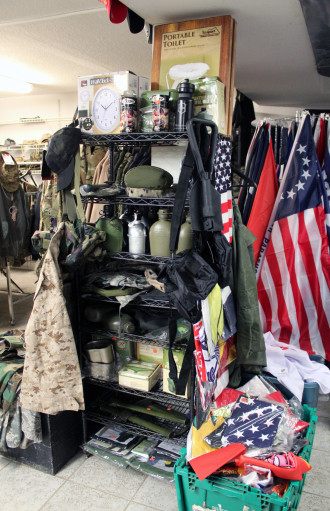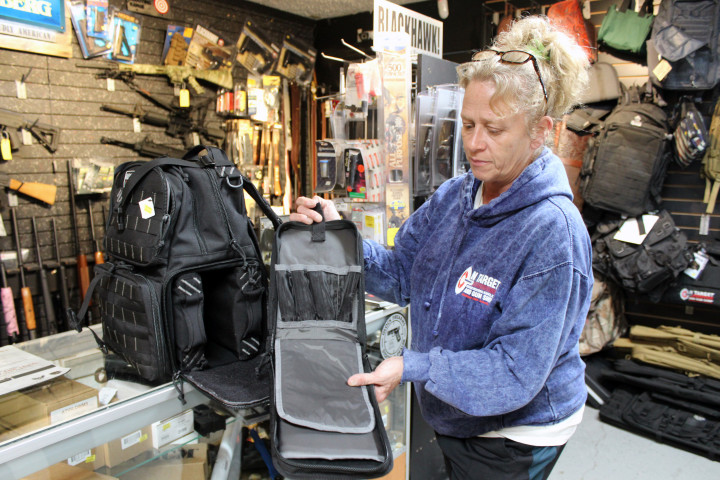Preppers — those who focus on preparing themselves and their families for disruptions or disasters — are a diverse group. From those who plan for the possibility of a three-day power outage to others who store many years’ worth of food against a global apocalypse, Western North Carolina’s preppers employ a wide range of strategies for hedging their bets against an uncertain future.
Buncombe County’s prepper-in-chief is Emergency Services Director Jerry VeHaun, who’s held the post for 43 years. Over his tenure, the Woodfin resident (who also serves as the town’s mayor) has seen more than his fair share of floods, winter storms and power outages. As part of a state disaster-response team, he’s also dealt with the aftermath of hurricanes and tornadoes.
With all that experience under his belt, VeHaun still thinks the best emergency preparations are the most basic ones. “People need to think in terms of 72 hours,” he says. “They need to be able to make it on their own for three days.”
Taking the time to think through an evacuation scenario is also a good exercise. VeHaun suggests planning at least two different routes in case of an emergency requiring a quick getaway. Store important papers together so you can grab them and go. And consider keeping some cash on hand, since ATMs may not work if the power is down.
Perhaps the greatest impediment to becoming more prepared, according to VeHaun, is human nature. “[People] think about it and they’ll know that they need to do it, but they won’t follow through,” he explains. To encourage awareness, VeHaun directed a communitywide PrepareAthon in coordination with the Federal Emergency Management Association on March 9, which brought together government agencies, businesses and local schools to practice disaster drills.
Preparing for the worst

Ex-Marine Conley Dale Patterson is a genial bard with a seemingly limitless stockpile of doomsday predictions. Over 6 feet tall, the 72-year-old preparedness guru has a booming voice and deep belly laugh that frequently fill his shop, Smoky Mountain Preppers and Surplus on Patton Avenue. These days, however, Patterson and many of his customers are talking a lot about the planet Nibiru, which Patterson says is seven times the size of the Earth. When the mini-solar system of which Nibiru is a part passes near Earth’s orbit around March 23, Patterson explains, he and others in the prepper community foresee cataclysmic natural disasters. Enormous chunks of Nibiru’s iron-rich debris tail, they say, will crash into Earth, whose rotation will slow or stop in response to Nibiru’s gravitational pull, creating tidal waves up to 800 feet tall that will devastate every coastline in the world.
“Basically, around the first of April, 150 miles inland of all the coastlines in the world will be gone, and everybody who lives there will be gone, too,” Patterson predicts.
All that planetary disruption, he continues, will trigger earthquakes and volcanic eruptions. In a nutshell, planet Earth will be “in deep doo-doo,” and everything to the east of Interstate 85 will be wiped off the map. That, he believes, makes Asheville a very desirable place to be: At 2,400 feet above sea level, it’s safe from the tidal waves yet still low enough to dodge the excessive solar radiation stemming from the degraded state of the atmosphere.
Nibiru, also known as Planet X, has been predicted to be about to crash into the Earth several times in the past; it has been dismissed by mainstream scientists as unfounded.
Meanwhile, Patterson also worries about economic decline. “Those who are awake, who have their eyes open and who listen — they know things aren’t right,” he declares, citing economic concerns in Greece and Europe, as well as precipitous declines in China’s stock market, as issues that he and other preppers are watching closely.
But the economic situation isn’t much better here at home, Patterson maintains. The federal government, he says, “falsifies the unemployment numbers: It’s really around 24 percent.”
Impending global catastrophe isn’t the only thing on Patterson’s mind. He was arrested on federal weapons charges last October; he posted bail, and the trial is set for April 25. He says he changed the name of his shop, which was formerly known as the Asheville Combat Zone, two months ago to reflect a shift in the business’s focus.
Bill Sterrett of Carolina Readiness Supply in Waynesville shares some of Patterson’s concerns. He’s also troubled by what he sees as a growing threat of terrorism and insurgency within the U.S. “We have no border security,” Sterrett maintains, and many visitors to the country overstay their visas. At the same time, he criticizes what he feels are intrusive government surveillance tactics and policies concerning the everyday activities of regular Americans.
Misti McCloud, who moved to the Asheville area after 20 years of working with federal agencies and Exxon Mobil Corp., says her knowledge of “the government’s contingency plans for specific scenarios” makes her skeptical about the effectiveness of our society’s disaster preparations.
“And, trust me, the TSA and Homeland Security can’t protect us. They were put in place to give citizens the illusion of security,” McCloud warns.
Like Patterson and Sterrett, she says our country’s infrastructure is “incredibly vulnerable,” citing risks to the electrical power grid such as a terrorist attack or a naturally occurring solar storm, which could instantly and permanently devastate all electronic components on the planet.
Yet despite these and other threats, many people, she points out, “drive around with not so much as a bottle of water in their car.”
Back to basics
Whether the perceived threat is celestial, meteorological, financial or human, all the preppers interviewed for this article urged readers to pull together some survival supplies and plans to help sustain them in the face of disruption or disaster. As McCloud puts it, “It’s not if something will happen — it’s when.”
In winter, notes Patterson, the No. 1 survival priority is avoiding hypothermia. That means wearing the right clothes, staying dry, and finding shelter and a way to make a fire as soon as possible.

Second on the list (or first during the warmer months), he continues, is ensuring an adequate supply of uncontaminated water. Patterson estimates that each person needs at least a gallon of water per day for drinking and cooking. A customer in Patterson’s shop who doesn’t want to give his name volunteers that he stores over 200 gallons in large food-grade barrels made of high-density polyethylene. To prevent the growth of algae or bacteria, he adds a splash of chlorine bleach.
“In a crisis or an incident, the last thing you need is to be wondering, ‘Where is my next drink of water coming from?’” says Sterrett. And though he believes people should make their own decision about how much water they should keep on hand, he recommends storing enough to provide at least a gallon per person per day for three months. For a family of four, that adds up to 360 gallons, which should be used strictly for drinking and cooking, says Sterrett. For bathing, laundry, crops and other needs, people should rely on rainwater.
Many kinds of water filters are readily available; both Sterrett and Patterson stock several types, as does Fifth Season Gardening Co. on Tunnel Road.
Though missing a meal or two wouldn’t hurt most of us, food is an obvious concern during any significant disruption. Conventional wisdom, observes Patterson, holds that area food supplies would be depleted in three days if supplies were interrupted. He thinks that’s far too optimistic: “It’d be more like three hours than three days,” he says.
For customers just starting out, Sterrett advises establishing a good supply of rice and beans, since those two foods provide a complete protein at a low cost and are easy to store. Along with cooking oil, multivitamins and spices, these items can form the basis of an emergency food plan.
Patterson carries MREs (an abbreviation of the military designation Meal, Ready to Eat), which provide an average of 1,200 calories per package. Some meals contain a flameless ration heater, which allows the food to be heated without using a stove or fire. One MRE costs about $10. For someone on a tight budget, Patterson advises purchasing two to four MREs along with a few other basic supplies (he recommends a knife, some cord and a good hatchet).
Sterrett agrees that MREs are a great preparedness product but cautions against depending exclusively on any one type of provision. “Variety, variety, variety,” he counsels. “I once had a customer who wanted 100 cases of MREs. I said, ‘Man, that is not a good idea.’” Though he recommends that everyone keep some MREs on hand, “A steady diet for months of MREs would not be a good thing,” Sterrett says.
Basic supplies such as toilet paper, cleaning products, soap and toothbrushes are also important to stock, Patterson and Sterrett say.
Most people fail to realize exactly how many resources they use on a regular basis, according to McCloud. Developing an awareness of how much a household consumes over a period of time is the first step in figuring out how much one needs to store, she explains.
For the long haul

Donna Miller leads the WNC Preparedness Group, which claims about 80 active members within a two-hour drive of Asheville. “We are not survivalists or hoarders but aim to share sustainability and peace in the midst of chaos by preparing and developing skills,” reads the group description on the Meetup website. “We are not focused on zombies, apocalypse, doomsday, politics or conspiracies. We agree with protection and the right to bear arms but are not focused on this topic, nor do we focus on militant action.”
When people first attend one of the group’s gatherings, says Miller, they invariably remark, “Gosh, you guys are so normal.” People come expecting group members to be decked out in camouflage and face paint, she says with a laugh, and most are pleasantly surprised to find a diverse gathering of folks with a wide range of interests and knowledge.
Besides leading the group, Miller publishes Prepare magazine, a monthly print and online journal focused on a range of self-sufficiency and survival skills and topics. For the past seven years, she’s hosted a preparedness podcast; she also runs Millers Grain House, an online store that sells whole grains and the tools for grinding them.
Miller traces her interest in preparedness back 27 years, when she and her husband were living in a rural part of Alabama near the Gulf of Mexico. “We experienced several natural disasters — tornadoes, hurricanes and ice storms. That got us thinking about some of the old skills that we hadn’t learned: canning, putting back food, starting a fire without matches.”
The couple moved to Western North Carolina 12 years ago with their three children, who are now adults. They live west of Asheville on 7 acres at 3,800 feet above sea level. The family strives to be self-sufficient, growing and preserving their own food.
“We don’t eat a lot of processed foods,” says Miller. “We will not buy the ready-made meals that other people tend to think of as food storage.” Miller’s goal is to have three to six months’ worth of food, so she has enough to share and to make it through a dormant season. Asheville’s Sow True Seed, she notes, is an important resource for her group, since the company sells only open-pollinated, nonhybrid seeds. That means gardeners can save seeds from one year’s crop to grow the next, helping them develop a sustainable food source.
“Everyone has a little prepper in them,” says Chris Smith of Sow True Seed. “We meet a lot of people who are interested in developing a sustainable food system that they have some sovereignty over. If they aim to be more sustainable, seed saving has to be part of the conversation.”
Community is a big part of Miller’s mindset, too. “Anyone who thinks they can be so prepared that they can go it alone is fooling themselves,” she asserts. “We discourage people from taking that lone wolf approach.”
Patterson and Sterrett, too, stress the importance of developing a core group of friends and family with a range of skills. “No one person can have all the skills you would need,” says Sterrett. To that end, his store hosts Heritage Life Skills each year; the multiday gathering features classes on a range of self-sufficiency topics, such as beekeeping, land navigation, hunting, trapping, emergency medicine, fire starting and food preservation. The event is also a chance to meet popular authors and personalities and connect with other preppers. Sterrett expects this year’s edition, slated for May 29-31 at the Haywood County Fairgrounds in Waynesville, to draw people from WNC, Georgia, eastern Tennessee and southern Virginia.
Straight shooter
“Now, when you say prepper, I’m not going to fill up my basement with stuff,” cautions Dawn Demetris-Stucker, the owner of On Target Indoor Shooting Range and Gun Shop just off Sweeten Creek Road in South Asheville. But she does believe in arming herself and her family with what they would need to survive a short-term emergency.

“We all have a bag,” she explains. “If we need to grab it and go, it’s ready. There’s no thinking about it.” Demetris-Stucker demonstrates the features of a tactical backpack she says is one of her store’s most popular products for preppers. “What if something happened and you needed to grab a bag and get out of town for three days? Can you imagine your family scurrying around looking for a flashlight and book of matches?” she asks.
“Get a backpack, pack it. Water filter, hatchet, fire starter kit, shovel, what you need: done,” Demetris-Stucker advises. Plan for a three- to five-day disruption, she says, adding, “If it’s worse than that, we’re all in trouble.”
Demetris-Stucker, who’s owned the busy gun store and shooting range with her husband, Jeff, since 1989, is also passionate about helping women develop the skills and awareness to defend themselves when needed. Every second Saturday morning, she offers special training sessions that teach shooting fundamentals and give participating women a chance to fire every caliber of handgun from a .22 to a .45. Stucker-Demetris also demonstrates nonlethal items such as stun guns and pepper spray.
“It’s a great freedom to be educated, no matter what you do then,” she says. “I want women to realize there’s a place I can go to get this training where a woman will hold my hand.”
It takes all kinds
Asked what kind of people make up the majority of his customers, Patterson says, “Actually, we get just about everybody. Old and young, black and white, men and women.”
He also gets plenty of folks who drive in from outlying rural areas. “They’re more into the prepping mentality than most city slickers,” says Patterson. “There’s too many breweries in Asheville: Everybody’s just drinking beer and not paying attention to what we think’s going to happen.”
Ultimately, however, he believes the city’s current popularity with visitors is an instinctive response to the same things that draw preppers to the area.
“People come to Asheville, and they feel so good. They don’t know why they like it so much: It’s their spirit telling them, ‘This is where you need to be.’ Their spirit and their soul tell them that here, they’ll have a chance of living.”






Misti McCloud, who moved to the Asheville area after 20 years of working with federal agencies and Exxon Mobil Corp., says her knowledge of “the government’s contingency plans for specific scenarios” makes her skeptical about the effectiveness of our society’s disaster preparations.
“And, trust me, the TSA and Homeland Security can’t protect us. They were put in place to give citizens the illusion of security,” McCloud warns.
LOL, but lefty loons tell me the 2nd Amendment is not longer applicable in today’s “progressive” society LOL, LOL, LOL. Problem with the preppers and many of the hipster weaklings that modern America indoctrinates is that they buy into the lefty loon kumbaya BS. And if the day comes and they do end up in a disaster situation, those who have the means to not only defend themselves but also project power will simply take what they want when they want lulz. And the helpless that the left has help create will not be able to cope. Better wake up lulz.
Yeah, I am prepared as well: Prepared to keep the paranoid hating loons like you from taking over the place. Get a life and evolve, as not everyone is the enemy. The irony is, all your stockpiled firearms and ammunition won’t matter when and if you are ever “painted” with a red dot emanating from somewhere you haven’t any knowledge of, and a second later, gone.
Enjoy life, and stop being afraid and so hateful of others.
LoL LUlz gunz lOL!1!1
It’s… interesting that the Mx has assembled a piece on disaster preparedness that includes people with crazy beliefs. I’m sure Mr Patterson can tell us how to purify ditchwater for drinking, but really, “planet Nibiru”? You might as well say that you’re proofing your basement against an impending invasion of giant mutant guinea pigs.
What next? A piece on the risks of flooding, talking to the county’s flood manager, a woman in Marshall who thinks she has gills, and a guy in Fairview who’s built an ark?
Funny, these folks don’t look very preppie to me.
Jokes aside, Luther, if you think those ar far out comments, try reading the shamless plugs for wacko new agey businesses that offer claims about ‘wellness’ without a shred of scientific proof. Don’t worry, The mtn X will publish anything as long as the almighty advertising dollar is secure.
I like the what if game personally- What if society does suffer a massive collapse? Who should we fear?
Ex military types who have proudly stockpiled weapons over the years. Canned food won’t let us raise subsequent generations to repopulate the earth.
The preppers, who polish the guns but don’t bother with storing seeds or learning to grow their own food, will travel in packs, robbiling, looting and possibly even killing in order to keep their “Walking Dead” dream alive.
Preppers will not contribute to rebuilding society for having a lack of skills. Electricians, farmers, teachers and scientists will be cast aside- they will establish a military based feudal society like something out of an awful Mad Max movie.
I’m sure those preppers sure can shoot good, as they constantly remind us. Too bad bullets are a finite resource and when all the lead is gone, they’re really going to complain about having to use bows and arrows, snares and fishing line to eat.
Pardon the typos it’s Friday, I’m in a hurry to leave work and meet friends and discuss non depressing topics like anything but the collapse of society and wacko far right conspiracy theories.
Isn’t the gob’ment yo’ friend when you wear a uniform, but when you’re surrounded by peace loving civilians, well, how funny that all changes?
There’s only one kind of crazy; not wanting to know
http://www.grandrapidsmn.com/opinion/columnists/does-the-sun-have-a-companion/article_c4d2512c-e7ad-11e5-b822-b3b036d160c2.html
http://www.breakingisraelnews.com/63806/new-information-revealed-exact-date-disaster-comet-nibiru-jewish-world/#gemj5Vh8Rvysse7w.97
Long story short, the sun’s moon is coming, moons CANNOT HIT PLANETS, and this moon will not hit us. It will, however put on quite the show, so check out the night sky!!!
As a recently retired federal employee and veteran of the U.S. Military Intelligence program for 36 years, I take offense to McCloud’s disparaging statement:
“And, trust me, the TSA and Homeland Security can’t protect us. They were put in place to give citizens the illusion of security,” McCloud warns.
Fact is – there is no way McCloud could draw this conclusion working administrative support for the government or Exxon. Just what we need, more fear mongers and attention seekers.
Would love to learn and know about groups that will help me and my family take shelter when the time comes. Thinking about moving west past the mountains because I live in virginia and on the coast. I believe in the Bible and believe nibiru in in Revelations ch.12. it’s time to be prepared.
When that day comes ( any number of scenarios) we will be sought after – and no longer mocked by the tree huggers